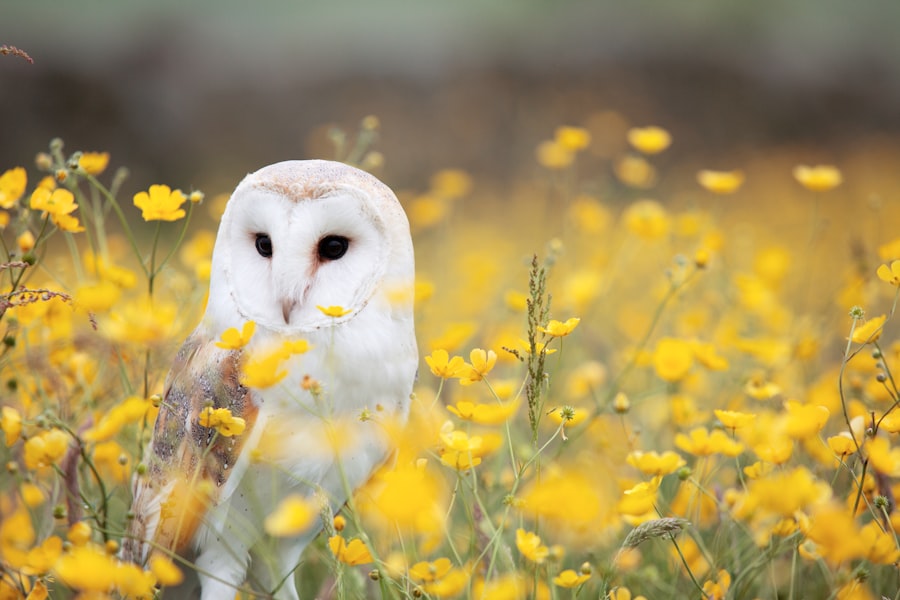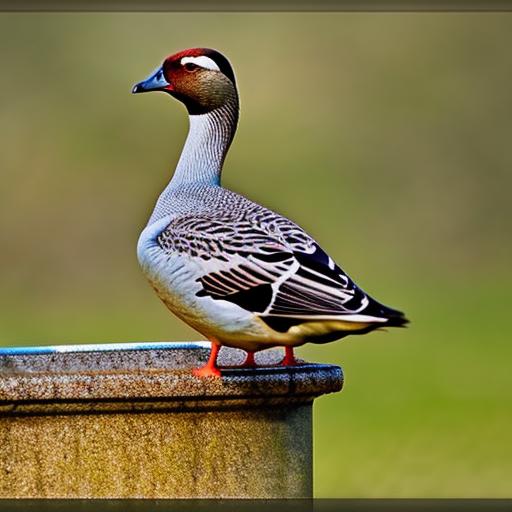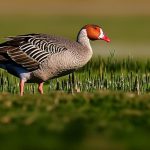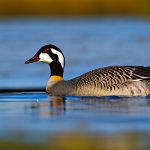Bird watching is a popular hobby enjoyed by many people around the world. It provides a sense of peace and tranquility, as well as the opportunity to observe and appreciate the beauty of nature. However, one common problem that bird watchers often encounter is geese invading their bird feeders. Geese are attracted to bird feeders because they provide an easy source of food. In this article, we will discuss various strategies for keeping geese away from your bird feeder, allowing you to enjoy your hobby without any interruptions.
Key Takeaways
- Geese are social birds that prefer to feed in groups and are attracted to open spaces with easy access to water.
- When choosing a bird feeder, opt for one that is designed to deter geese, such as those with narrow perches or cages.
- Position your bird feeder in an area that is difficult for geese to access, such as near a fence or under a tree.
- Decoys can be effective in deterring geese, but they need to be moved regularly to maintain their effectiveness.
- Planting goose-resistant plants around your bird feeder can help to discourage geese from feeding in the area.
Understanding the behavior of geese
Geese are attracted to bird feeders for several reasons. Firstly, they are social animals and are often found in large flocks. When one goose discovers a food source, it will communicate this information to the rest of the flock, leading to a mass invasion of your bird feeder. Secondly, geese are opportunistic feeders and will take advantage of any easily accessible food source. Bird feeders provide a constant supply of food, making them an attractive option for geese.
Geese are also territorial animals and will defend their feeding areas from other geese. This territorial behavior can lead to aggressive encounters between geese and other birds at your bird feeder. Geese will often chase away smaller birds and monopolize the food source for themselves. Understanding these behaviors can help you develop strategies to deter geese from invading your bird feeder.
Choosing the right bird feeder
Choosing the right bird feeder can make a significant difference in deterring geese from invading it. There are several types of bird feeders available, including platform feeders, tube feeders, and suet feeders. Geese are less likely to be attracted to tube feeders because they require more effort to access the food. Platform feeders can also be effective in deterring geese if they are positioned correctly.
In addition to choosing the right type of bird feeder, it is important to select one that is easy to clean. Geese are attracted to bird feeders that have leftover food or debris, so regularly cleaning your feeder will help discourage them from visiting. Look for feeders that have removable trays or perches that can be easily cleaned.
Positioning your bird feeder strategically
The location of your bird feeder can greatly affect the likelihood of geese invading it. Geese are attracted to water sources, so it is important to keep your bird feeder away from any ponds, lakes, or rivers. If possible, position your feeder in an open area where geese are less likely to feel safe and comfortable.
You can also consider using a pole or post to elevate your bird feeder. This will make it more difficult for geese to access the food and discourage them from trying. Additionally, placing the feeder near trees or shrubs can provide some protection for smaller birds while making it more challenging for geese to reach the food.
Using decoys to deter geese
Using decoys is another effective strategy for scaring geese away from your bird feeder. Decoys mimic the appearance of geese and can be placed near your feeder to create the illusion of a larger flock. This can intimidate geese and discourage them from approaching.
There are different types of decoys available, including stationary decoys and motion decoys. Stationary decoys are simple plastic replicas of geese that can be placed around your feeder. Motion decoys, on the other hand, have moving parts that simulate the movement of real geese. These can be more effective in deterring geese as they create a more realistic and dynamic environment.
Planting goose-resistant plants around your bird feeder

Planting goose-resistant plants around your bird feeder can also help deter geese from invading it. Geese are less likely to eat certain types of plants, so choosing these plants can create a natural barrier between the geese and your feeder.
Some examples of goose-resistant plants include ornamental grasses, lavender, and yarrow. These plants have strong scents or textures that geese find unappealing. It is important to choose plants that are native to your area, as they will be better adapted to the local climate and require less maintenance.
Installing physical barriers to keep geese away
Installing physical barriers is another effective strategy for keeping geese away from your bird feeder. There are several types of barriers available, including fences, netting, and spikes. These barriers create a physical obstacle that prevents geese from accessing the feeder.
When choosing a barrier, it is important to consider both its effectiveness and aesthetics. You want a barrier that will effectively deter geese but also blend in with your garden or yard. Opt for barriers that are made of materials such as wire or mesh, as they are less likely to be damaged by geese.
Using noise and motion to scare geese off
Using noise and motion devices can be an effective way to scare geese away from your bird feeder. Geese are easily startled by sudden movements or loud noises, so using these devices can create a hostile environment for them.
There are various noise and motion devices available, including scarecrows, wind chimes, and ultrasonic devices. Scarecrows are life-sized replicas of humans that can be placed near your feeder to deter geese. Wind chimes create noise when the wind blows, which can startle geese and discourage them from approaching. Ultrasonic devices emit high-frequency sounds that are unpleasant to geese but not audible to humans.
Creating a separate feeding area for geese
Creating a separate feeding area for geese can be a beneficial strategy for keeping them away from your bird feeder. By providing an alternative food source specifically for geese, you can redirect their attention away from your feeder.
Choose a location that is away from your bird feeder and set up a separate feeding area for the geese. This can be as simple as scattering birdseed or cracked corn on the ground. By providing an easily accessible food source for the geese, you can reduce their motivation to invade your bird feeder.
Removing attractants that draw geese to your yard
There are several attractants that draw geese to your yard, and removing these attractants can discourage them from invading your bird feeder. One common attractant is open water sources, such as ponds or pools. Geese are attracted to water and will often congregate near these areas. By removing or covering these water sources, you can make your yard less appealing to geese.
Another attractant is lush, green grass. Geese are herbivores and will graze on grass if it is available. Keeping your lawn well-maintained and free of excess vegetation can help deter geese from visiting your yard.
Seeking professional help to manage geese infestations
If you have a severe geese infestation that cannot be managed using the strategies mentioned above, it may be necessary to seek professional help. There are professionals who specialize in wildlife management and can provide effective solutions for dealing with geese infestations.
When choosing a professional, it is important to consider their experience and expertise in dealing with geese. Look for professionals who have a proven track record and positive reviews from previous clients. Additionally, consider their methods and ensure they align with your values and preferences.
In conclusion, keeping geese away from your bird feeder requires a combination of strategies that target their behavior and preferences. By understanding the behavior of geese, choosing the right bird feeder, positioning it strategically, using decoys, planting goose-resistant plants, installing physical barriers, using noise and motion devices, creating a separate feeding area, removing attractants, and seeking professional help if necessary, you can successfully deter geese from invading your bird feeder. Remember to be patient and try different strategies until you find one that works for you. Happy bird watching!
If you’re looking for effective ways to keep geese away from your bird feeders, you might also be interested in learning about the SnapLock Chicken Coop from Poultry Wizard. This innovative chicken coop design not only provides a safe and secure home for your chickens but also includes features that can help deter geese and other unwanted visitors. With its sturdy construction and clever design, the SnapLock Chicken Coop offers a practical solution to keep your bird feeders free from interference. Check out the article on Poultry Wizard’s website to discover more about this fantastic coop: https://poultrywizard.com/keeping-chickens/snaplock-chicken-coop/.
FAQs
What are some common problems caused by geese at bird feeders?
Geese can cause a variety of problems at bird feeders, including eating all the birdseed, damaging the feeders, and leaving behind droppings that can be unsanitary and difficult to clean.
What are some effective ways to keep geese away from bird feeders?
Some effective ways to keep geese away from bird feeders include using physical barriers like fences or netting, using decoys or scare tactics like loud noises or flashing lights, and using taste or scent deterrents like hot sauce or predator urine.
Are there any natural ways to keep geese away from bird feeders?
Yes, there are some natural ways to keep geese away from bird feeders. Planting certain types of vegetation like tall grasses or shrubs can create a natural barrier that geese are less likely to cross. Additionally, creating a water feature like a pond or fountain can deter geese from coming too close.
Is it safe to use chemical deterrents to keep geese away from bird feeders?
While there are some chemical deterrents available on the market, it is generally not recommended to use them as they can be harmful to both the geese and other wildlife in the area. It is best to stick to natural or physical deterrents.
How often should I clean my bird feeders to prevent geese from being attracted to them?
It is recommended to clean bird feeders at least once a month to prevent the buildup of birdseed and other debris that can attract geese. Additionally, regularly removing any spilled seed from the ground can also help deter geese from coming too close.
Meet Walter, the feathered-friend fanatic of Florida! Nestled in the sunshine state, Walter struts through life with his feathered companions, clucking his way to happiness. With a coop that’s fancier than a five-star hotel, he’s the Don Juan of the chicken world. When he’s not teaching his hens to do the cha-cha, you’ll find him in a heated debate with his prized rooster, Sir Clucks-a-Lot. Walter’s poultry passion is no yolk; he’s the sunny-side-up guy you never knew you needed in your flock of friends!







